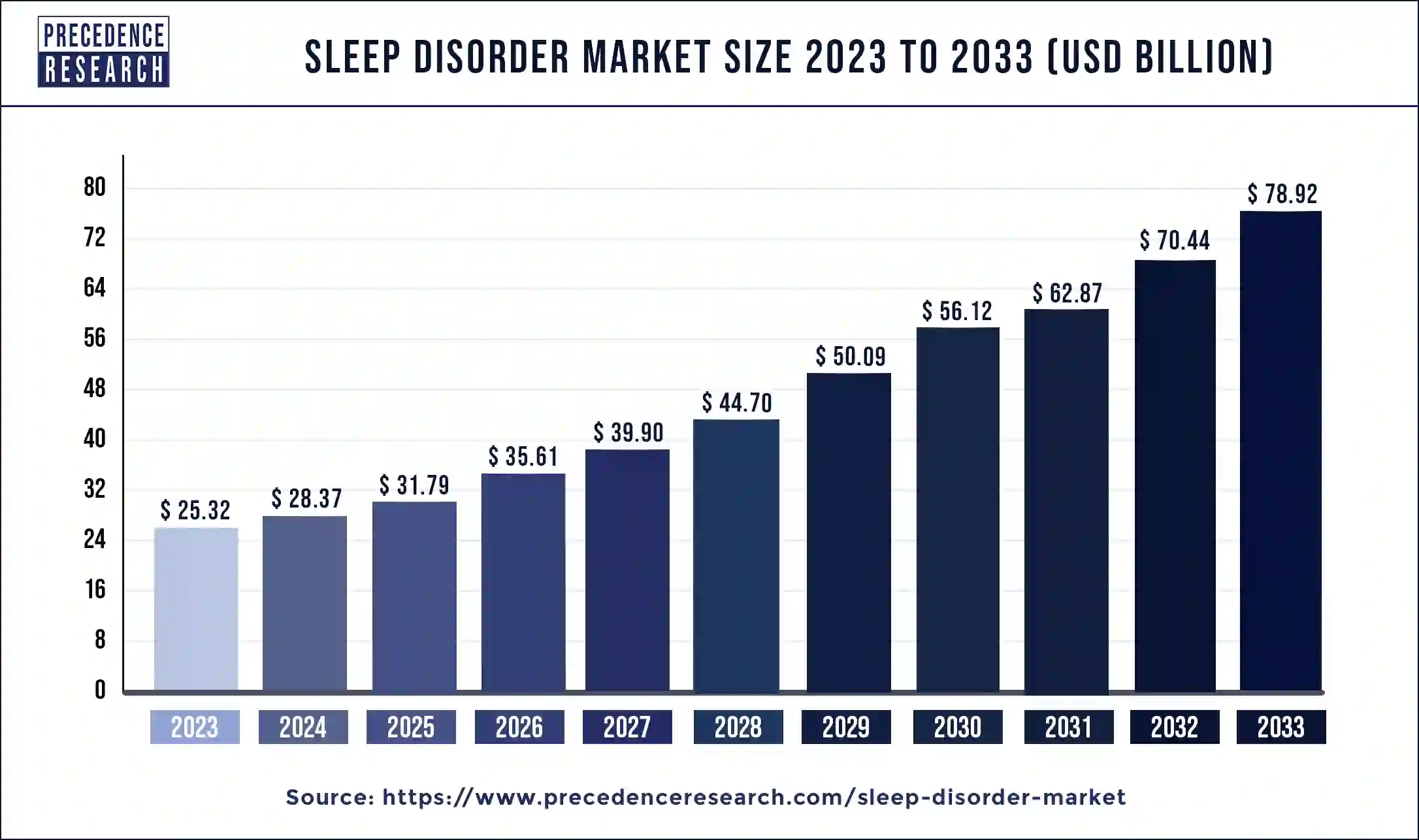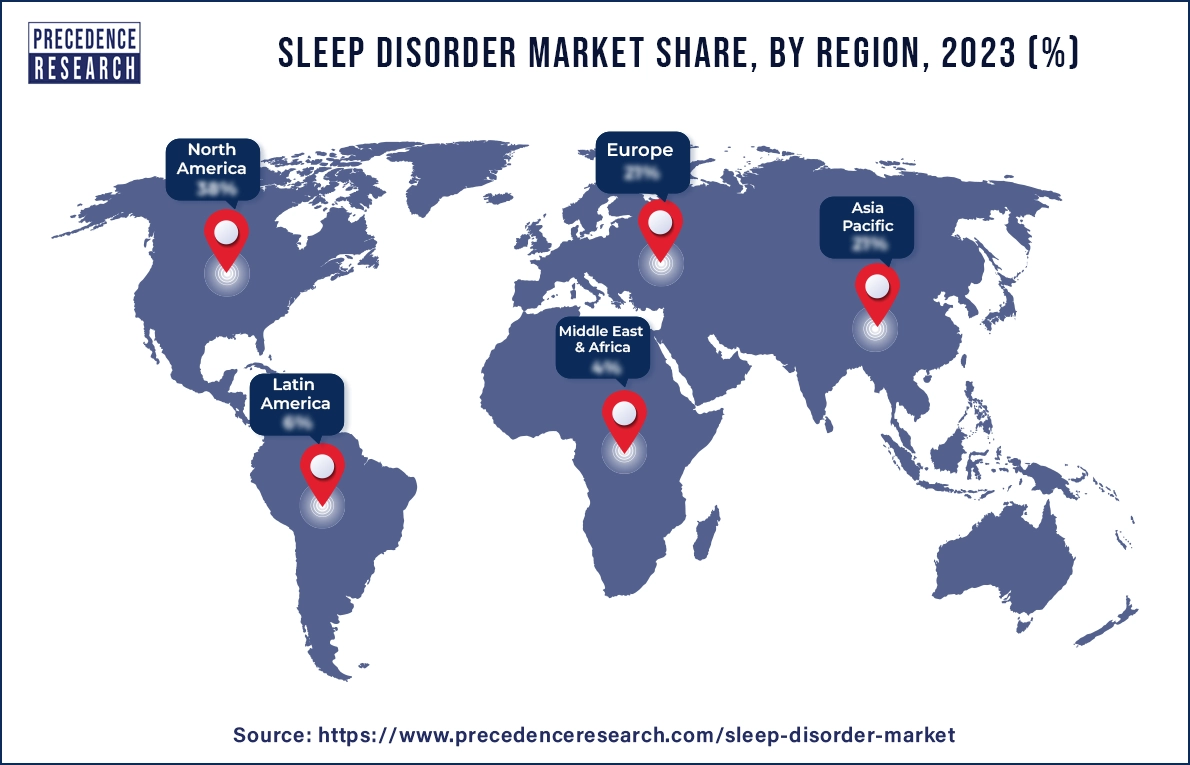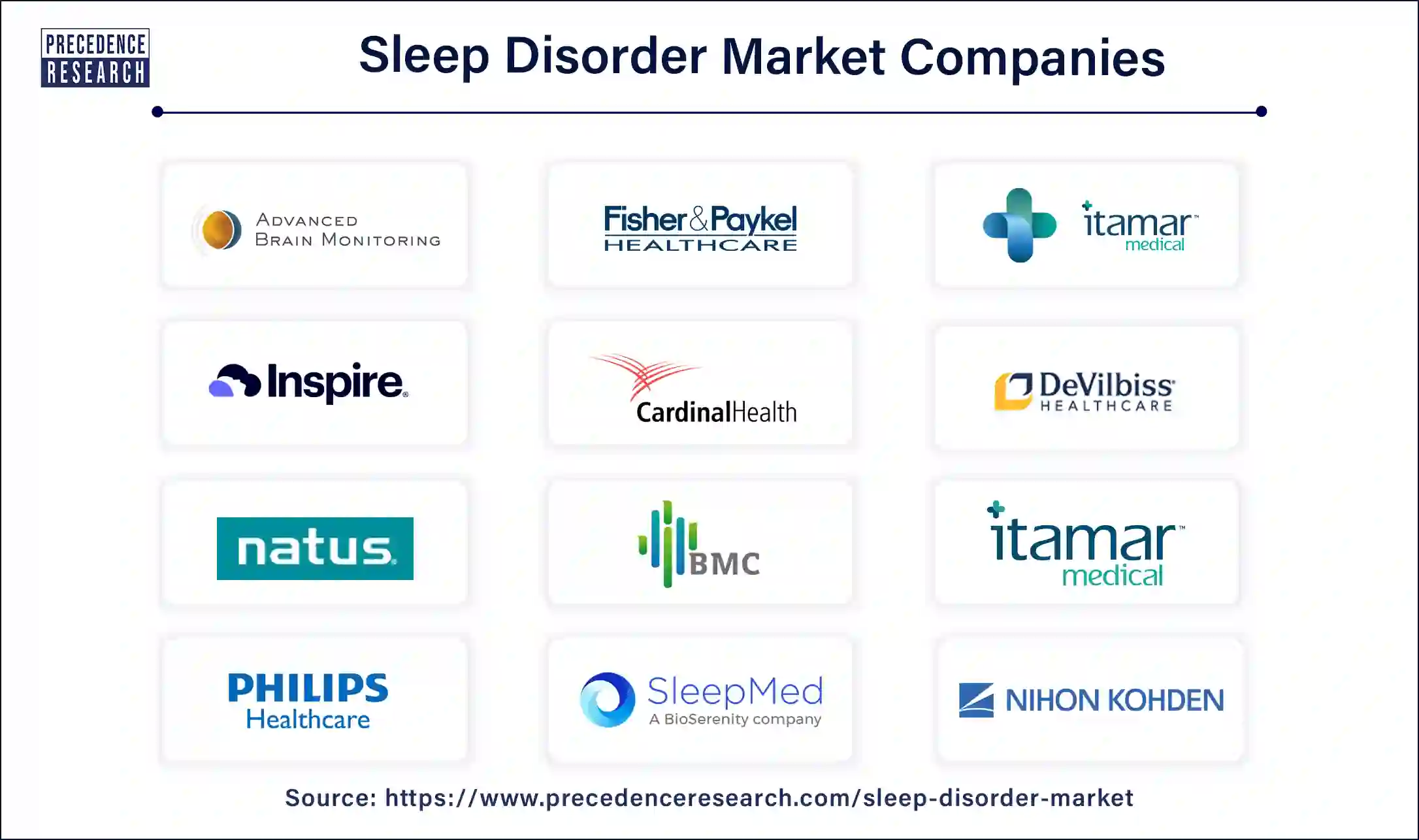January 2025
Sleep Disorder Market (By Disorder: Restless Legs Syndrome, Narcolepsy, Insomnia, Sleep Apnea; By Product: Diagnostics, Therapeutics; By End-user: Hospitals & Sleep Laboratories, Home Care Settings & Individuals) - Global Industry Analysis, Size, Share, Growth, Trends, Regional Outlook, and Forecast 2024-2033
The global sleep disorder market size was valued at USD 25.32 billion in 2023 and is anticipated to reach around USD 78.92 billion by 2033, growing at a CAGR of 12.04% from 2024 to 2033. The rising prevalence of sleep disorders among the adult population is driving the market growth.

Sleep Disorder Market Overview
Sleep disorders refer to conditions where the sleep patterns are disrupted, which affects the quality and quantity of sleep. Some common types of sleep disorders are sleep apnea, insomnia, narcolepsy, and restless leg syndrome. These conditions can lead to irregular sleep patterns, which can cause daytime fatigue and sleepiness. These conditions are increasing rapidly due to several factors like stressful lifestyles, irregular sleep patterns, an increasing geriatric population, and many more. These factors significantly affect overall health and quality of life.
The sleep disorder market refers to the diagnosis, treatment, and managing various conditions related to sleep disorders. The sleep disorder market has gained significant attention due to various factors, including the influence of Western work culture, various health conditions due to rapid urbanization, etc. These factors have resulted in increasing stress levels, which has increased the demand for convenient diagnosis and treatment related to sleep disorders. The industry has witnessed growth due to technological advancements like CPAP therapies and wearable devices, which help individuals monitor their health and opt for similar treatments.
| Report Coverage | Details |
| Sleep Disorder Market Size in 2023 | USD 25.32 Billion |
| Sleep Disorder Market Size in 2024 | USD 28.37 Billion |
| Sleep Disorder Market Size by 2033 | USD 78.92 Billion |
| Sleep Disorder Market Growth Rate | CAGR of 12.04% from 2024 to 2033 |
| Largest Market | North America |
| Base Year | 2023 |
| Forecast Period | 2024 to 2033 |
| Segments Covered | Disorder, Product, End-user, and Regions |
| Regions Covered | North America, Europe, Asia-Pacific, Latin America, and Middle East & Africa |
Drivers
Upsurge in sleep disorders
According to a study, the current number of sleep disorders among adults has increased by around 50 to 70 million. The dynamics have drastically changed with the evolution and increasing technologies. Many people are currently living an unhealthy lifestyle, which usually leads to various medical conditions, including sleep disorders like insomnia, sleep apnea, and Restless legs syndrome (RLS). These medical conditions have witnessed a rapid surge, where conditions like insomnia affect approximately 30% of the adult population worldwide. This also includes various environmental factors like noise and light pollution. This is basically due to the increasing concrete jungle and lack of biodiversity. The increasing rates of global disorders are potentially benefiting the global sleep disorder market as they are increasing the demand for healthcare providers, medical device manufacturers, and many more.
Increasing awareness regarding sleep disorders
Many healthcare professionals, along with organizations and governments, have been constantly spreading awareness regarding the adverse health impacts of sleep disorders. Sleep disorders are one of the increasing conditions among the adult population due to various factors that have affected their overall health. One of the professional's reports stated that sleep disorders are severely affecting people economically due to the lack of productive time.
The increasing number of educated population regarding the effects of sleep disorders is helping people to suspect their problems and cure them at an early stage. This is increasing the demand for various treatment options and is also driving the growth of various healthcare service providers.
Restraint
Higher costs of treatments
The higher costs of various medical drugs and therapies could hinder the growth of the sleep disorder market. There are many recent technological advancements in developed regions, but the lack of connectivity increases the costs of drugs and other devices. The higher costs are not affordable by the middle-class population due to limited salary income. Therefore, health insurance companies should include sleep disorder treatments in their policies to increase the number of people opting for health insurance, resulting in more demand for sleep disorder treatment and therapies.
Opportunities
Increasing technological advancements
The increasing technology is expected to boost the growth of various diagnostic tools like portable sleeping monitoring machines, wearable sensors, etc. The trending AI is also expected to play a vital role in the sleep disorder market as many researchers are utilizing the AI algorithm to track people's sleeping cycles and preferences. There have also been many recent advancements in wearable devices. Recently, a company named Zansors came up with a new wireless wearable patch device that measures human breathing patterns using a microphone and an accelerometer, which helps track recorded movement. This would help the companies work on the customer preferences and open many opportunities for the industry professionals.
Demand for telemedicine
Due to the increasing competitors in the healthcare sector, telemedicine has gained significant attention in recent years. It refers to the use of audio-visual technology for treating patients, which provides cost-effective treatment to patients compared to other treatment options. These services remove geographical barriers and create a wider option for the patients. Telemedicine is rapidly gaining as it targets the main population that is suffering from sleep disorders, i.e., the geriatric population. Various upcoming monitoring devices will significantly contribute as they will provide better patient analysis. These factors are considered to bring significant growth in the sleep disorder market.
The sleep apnea segment dominated the sleep disorder market with the largest share in 2023. The rising number of aged populations is increasing the sleep apnea illness. Sleep apnea refers to the condition where the patient observes repeated pauses in breathing while sleeping. This severely affects the sleep cycle and could lead to serious health complications. Obstructive sleep apnea is the most common type of condition where the throat muscles relax excessively during the sleeping period.
This causes blockage in the airways, which affects breathing and leads to disruptions in the body's oxygen levels. Central sleep apnea is a form of sleep apnea where the brain is unable to send signals to the muscles that control the breath during sleep. This pauses the breath and leads to a disrupted sleep cycle. These factors increase the demand for various therapies and medications for sleep disorder treatment.
The insomnia segment is expected to grow at the fastest CAGR during the forecast period. Insomnia is the most common type of sleep disorder, which involves difficulty sleeping for a long time. The most common reason behind insomnia is stress, which is one of the common factors in today’s generation. This affects human productivity because of the fatigue caused during the day.
This can also lead to several health issues, which may affect the longevity of the person. Insomnia is expected to grow at the fastest CAGR during the forecast period due to the changing dynamics in human lifestyles, changing work schedules, night shift jobs, jet lags, and many more. These factors are increasing the need for more healthcare centers, convenient therapies, and multiple telemedicine and remote monitoring options.
The diagnostics segment dominated the global sleep disorder market in 2023. The reason for the dominance is the increasing demand for polysomnography, as the device records various physiological factors during sleep. The PSG device tracks heart rate (HR), brain waves, muscle activity, and eye movements. These devices are used for patients suffering from sleep apnea and narcolepsy.
The actigraphy systems have also witnessed significant growth in terms of shares due to the increasing awareness of sleep disorders among the public. These are wearable wrist devices that help in tracking various activities during daily lifestyles. The increasing aging population is the main factor behind the growth of such diagnostics; they provide various treatments to track such conditions in the early stages.
The therapeutics segment is also expecting growth at a significant rate during the forecast period due to the increasing number of sleep disorders around the world. Therapeutics are treatments and inventions that aim to manage the symptoms associated with sleep disorders. Some of the therapeutic devices include airway clearance systems, oxygen devices, and adaptive servo-ventilation. They target issues like sleep apnea, insomnia, and many more. Oral therapies are gaining significant attention as people are more aware of the advantages of portable devices.
The hospitals & sleep laboratories segment dominated the sleep disorder market in 2023. The increasing number of sleep disorders has resulted in the need for more specific treatments. Specialized sleep labs and hospitals have dominated due to the upcoming treatment options like polysomnography and HSAT for people suffering from sleep disorders. The market is expected to gain decent growth over the years due to the increasing number of sleep disorder cases.
The homecare settings & individuals segment is expected to witness the fastest growth with a significant CAGR during the forecast period. The reason behind the rapid growth is the advancement in the homecare setup. People prefer setups that are easy and convenient to use. The increasing number of sleep apnea device users is driving the growth of homecare settings in the sleep disorder market.
North America dominated the global sleep disorder market with the largest share revenue in 2023. The presence of key market players in the United States is the main factor behind the dominance of the region. The region has also witnessed a massive number of people suffering from sleep disorders due to their lifestyle. The governments are also promoting the advantages of sleep disorder products so that people can identify and cure the conditions at a very early stage. The dominance of information technology in the United States is leading to many convenient options for treatment devices. The region also has a huge healthcare infrastructure that provides many opportunities for new manufacturers and healthcare professionals.

Europe held the second-largest share of the sleep disorder market in 2023. The region has witnessed massive awareness regarding the adverse health effects of sleep disorders. This has increased the demand for various diagnostics and treatments in the region. The growing adult population has witnessed demand for various portable devices. European countries are focusing on various R&D activities, which could potentially boost the growth of the sleep disorder market.
Asia Pacific is expected to grow at the fastest CAGR during the forecast period. The region is driven by various factors, such as changing lifestyles due to urbanization, which has impacted the overall health of many people. This is increasing awareness regarding the benefits of sleep disorder treatments. Countries like China, India, and Japan are focusing on technological advancements that would benefit the region's growth.

Segments Covered in the Report
By Disorder
By Product
By End-user
By Geography
For inquiries regarding discounts, bulk purchases, or customization requests, please contact us at sales@precedenceresearch.com
No cookie-cutter, only authentic analysis – take the 1st step to become a Precedence Research client
January 2025
February 2025
December 2024
September 2024